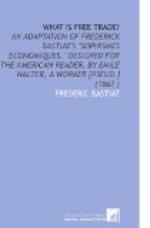A is a favored country; B is maltreated by Nature. Mutual traffic then is advantageous to both, but principally to B, because the exchange is not between utility and utility, but between value and value. Now A furnishes a greater utility in a similar value, because the utility of any article includes at once what Nature and what labor have done; whereas the value of it only corresponds to the portion accomplished by labor. B then makes an entirely advantageous bargain; for by simply paying the producer from A for his labor, it receives in return not only the results of that labor, but in addition there is thrown in whatever may have accrued from the superior bounty of Nature.
We will lay down the general rule.
Traffic is an exchange of values; and as value is reduced by competition to the simple representation of labor, traffic is the exchange of equal labors. Whatever Nature has done towards the production of the articles exchanged, is given on both sides gratuitously; from whence it necessarily follows, that the most advantageous commerce is transacted with those countries which are the least favored by Nature.
The theory of which I have attempted in this chapter to trace the outlines, deserves a much greater elaboration. But perhaps the attentive reader will have perceived in it the fruitful seed which is destined in its future growth to smother Protectionism, at once with the various other isms whose object is to exclude the law of COMPETITION from the government of the world. Competition, no doubt, considering man as producer, must often interfere with his individual and immediate interests. But if we consider the great object of all labor, the universal good, in a word, Consumption, we cannot fail to find that Competition is to the moral world what the law of equilibrium is to the material one. It is the foundation of true gratification, of true Liberty and Equality, of the equality of comforts and condition, so much sought after in our day; and if so many sincere reformers, so many earnest friends to public right, seek to reach their end by commercial legislation, it is only because they do not yet understand commercial freedom.
CHAPTER V.
OUR PRODUCTIONS ARE OVERLOADED WITH INTERNAL TAXES—
This is but a new wording of the Sophism before noticed. The demand made is, that the foreign article should be taxed, in order to neutralize the effects of the internal tax, which weighs down domestic produce. It is still then but the question of equalizing the facilities of production. We have but to say that the tax is an artificial obstacle, which has exactly the same effect as a natural obstacle, i.e. the increasing of the price. If this increase is so great that there is more loss in producing the article in question at home than in attracting it from foreign parts by the production of an equivalent value of something else—laissez faire. Individual interest will soon learn to choose the lesser of two evils. I might refer the reader to the preceding demonstration for an answer to this Sophism; but it is one which recurs so often, that it deserves a special discussion.




